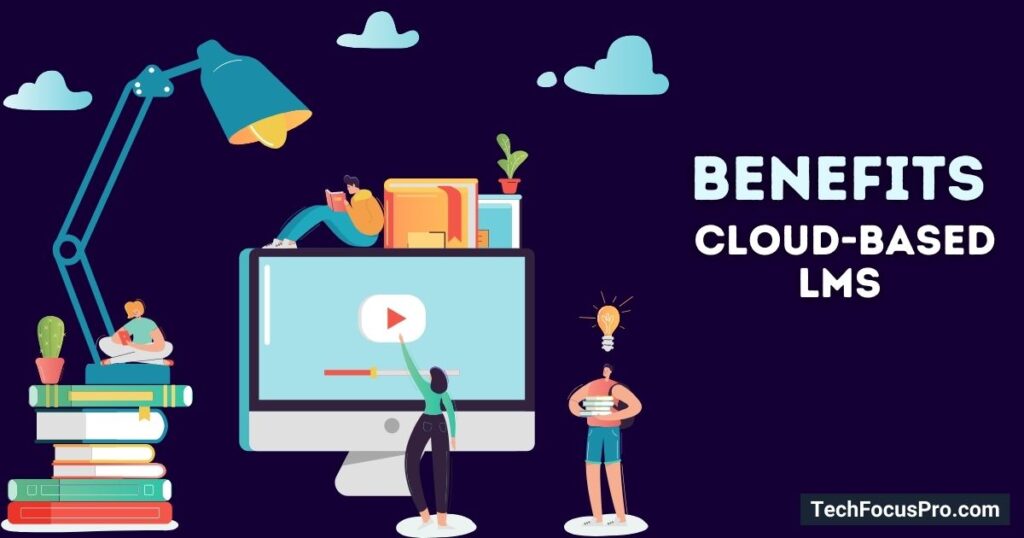
LMSs play a crucial role in modern education as they offer a versatile approach to learning.
The use of LMS is growing steadily as more schools and businesses recognize their effectiveness, particularly after witnessing the benefits they offer during the pandemic.
In the coming sections, we will examine exciting future trends in cloud-based LMS. These may include personalized learning experiences, better mobile access, and advanced technologies like artificial intelligence that can make learning even more engaging and effective.
Understanding Cloud-Based Learning Management Systems
LMS, also known as Cloud-based learning Management Systems, are internet-based platforms or software designed to facilitate the learning process for both teachers and students. These systems enable users to conveniently access course materials, submit assignments, and communicate with one another, regardless of their location, as long as they have an internet connection.
Recent Statistics on Cloud-Based Learning Management Systems
The latest statistics show that many organizations use cloud-based Learning Management Systems (LMS) for training and development. Here are some key points to consider:
- In the United States, training expenditure surpassed $100 billion during the period of 2021-2022.
- The rise in expenditure can be attributed in part to businesses investing in virtual training technologies, such as LMS.
- By 2023, almost 40% of organizations are projected to purchase LMS in order to improve their training programs.
- Furthermore, a significant 36% of companies express their interest in acquiring authoring tools and systems specifically designed for crafting training content.
- In conclusion, 30% of individuals are interested in purchasing tools for the purpose of creating training materials.
The significance of LMS in facilitating effective workforce development for organizations is emphasized by these figures.
Source: Research.com
Growth of the Corporate LMS Market

It is important to highlight that the global corporate Learning Management Systems (LMS) market is projected to grow significantly from 2020 to 2024. The expected annual growth rate is 23%, which is considered relatively high.
The LMS market is projected to generate approximately $12.48 billion in revenue by the conclusion of this period. This substantial growth signifies the increasing recognition among companies of the significance of utilizing LMS for employee training and skill enhancement.
Future Trends of Cloud-Based Learning Management Systems
By utilizing personalized learning, students are empowered to acquire knowledge in a manner that suits their individual needs and pace. Through the utilization of a cloud-based learning management system, educators can tailor classes to cater to every student’s unique requirements and preferences.
By fostering an environment where students who learn at varying speeds can thrive collectively, the process of learning becomes both more effective and enjoyable.
Embracing Microlearning: The Power of Bite-Sized Content
Microlearning breaks down information into smaller, easily digestible segments. Instead of enduring lengthy lectures, students have the option to engage with concise resources like short films, tests, or articles that concentrate on a specific topic. This allows students to learn at their convenience, enabling them to grasp complex subjects without feeling overwhelmed.
Engaging with AI: Intelligent Learning Management Systems

The utilization of artificial intelligence (AI) can enhance the pleasure of learning. AI has the capability to assess students’ progress and suggest suitable learning resources tailored to their unique learning preferences. For example, if a student struggles with math, the AI-powered Learning Management System (LMS) can offer extra math practice problems. This intelligent assistance greatly aids students in better understanding difficult subjects.
Learning Made Fun: The Role of Gamification
Gamification involves incorporating game-like elements into the learning process to enhance engagement and motivation. This can include setting and achieving goals, earning badges for achievements, or accumulating points. By making lessons enjoyable and exciting, students are more likely to stay engaged and motivated in their studies.
Prioritizing Safety: Enhanced Security in Online Learning
As online education continues to grow, it is of utmost importance to protect personal information. In order to ensure the safety of user data, cloud-based LMS providers have prioritized strengthening security measures. This means that educators and students can confidently make use of these platforms, knowing that their personal information will not be compromised or exploited.
Investing in Growth: Continued Professional Development (CPD)

Maintaining current knowledge of the newest instructional techniques and technological advancements requires instructors and trainers to engage in Continued Professional Development (CPD). A cloud-based learning management system (LMS) frequently offers tools and courses to help teachers advance their careers, raising the standard of instruction for students.
Seamless Learning with Integrated E-Learning Technologies
By incorporating multiple e-learning resources, the learning process becomes more cohesive and uninterrupted. For example, the inclusion of interactive simulations or virtual reality (VR) can significantly augment the authenticity and involvement of the lectures. With the aid of technology, students can genuinely engage with the study material and acquire knowledge effectively.
Collaborative Learning: The Benefits of Social Interaction
The promotion of collaboration and information sharing among students is emphasized in social learning. With the advent of cloud-based learning management systems, students from any location can easily participate in study groups, collaborate on projects, and engage in discussions. This fosters interactive learning and helps cultivate collaborative abilities.
Flexibility for All: Scalable LMS as a Service
Long-term solutions are essential for businesses and educational institutions in search of a scalable learning management system (LMS) that can be customized to suit their specific needs and size. An exceptional cloud-based LMS offers the ability to expand alongside a school’s student body without any complications. This level of flexibility ensures that businesses and educational institutions can adapt and grow without limitations.
Informed Choices: Leveraging Data for Better Learning Outcomes
Cloud-based learning management systems (LMSs) collect comprehensive information on students’ learning processes. Educators can analyze this data to determine the most effective approaches for their students. By understanding students’ engagement with the subject, instructors can gradually improve learning outcomes by adjusting their teaching strategies.
Benefits of Cloud-Based LMS

1. Accessibility and Convenience
Cloud-based Learning Management Systems offer unparalleled accessibility, enabling users to securely log in from various locations such as their homes, workplaces, or even while on the move.
This feature facilitates different types of learning situations, including remote learning, hybrid models, and mobile training. It ensures that learning continues uninterrupted, even in increasingly remote work and educational environments.
2. Cost-Effectiveness
The affordability of software like cloud-based LMS is among its attractive advantages. The initial hardware, software, and maintenance expenditures for traditional LMS solutions are frequently very high.
On the other hand, cloud-based solutions typically operate through a subscription model, resulting in reduced initial expenses and providing predictable costs.
Organizations can now customize their learning solutions to suit their requirements and financial plans, all thanks to the pay-as-you-go model.
3. Scalability
Cloud-based LMS platforms are designed to rapidly expand in size.
Whether you are overseeing a small team or a large corporation with thousands of users, cloud-based systems can effortlessly accommodate varying workloads without the need for extensive infrastructure modifications.
The ability to scale easily enables efficient management of growth and flexibility to meet changing organizational requirements.
4. Automatic Updates and Maintenance
The responsibility of updates and maintenance for cloud-based LMSs lies with the service provider. As a result, customers need not concern themselves with staying updated as they will consistently have access to the most recent features and security enhancements.
The continuous reliability and security of the system are supported by automated maintenance.
5. Enhanced Collaboration and Interaction
Cloud-based LMS platforms often provide various communication and collaboration options, such as group project capabilities, chat functions, and forums. These features facilitate interaction between students and teachers, creating a more dynamic and engaging learning atmosphere.
Collaboration tools prove to be highly beneficial in remote and hybrid learning settings, as they effectively address the difficulties associated with maintaining connection and engagement.
6. Robust Data Security
Data protection is a top priority for LMS providers operating in the cloud. These providers ensure the safety of user data through advanced security measures such as encryption, regular backups, and strict access controls. This high level of security ensures the protection of sensitive data and adherence to data protection regulations.
Also explore helpful guide How is SaaS Software Distributed?
How Can We Train Educators to Effectively Use LMS?
It is essential to provide proper training to educators in order to use Learning Management Systems (LMS) efficiently and maximize the benefits of these digital tools.

To begin with, schools have the option to provide hands-on workshops that enable teachers to learn firsthand the navigation and utilization of the LMS. Such training sessions allow educators to actively engage, practice, and seek real-time clarification by asking questions.
Moreover, offering easily understandable guides or video tutorials can aid teachers in retaining the essential steps and functionalities of the system.
Creating a supportive community among teachers is another crucial factor. Through sharing experiences and tips, educators can discover innovative methods to effectively utilize the LMS.
By conducting regular follow-up training sessions, teachers can remain up-to-date with new features and techniques. This ultimately enables well-trained educators to more effectively engage their students and enhance the learning experience, resulting in a more impactful utilization of the LMS.
Conclusion
The introduction of Cloud-based Learning Management Systems has revolutionized education and training. These systems offer flexibility, scalability, and cost-effectiveness, making them an appealing choice for organizations, regardless of their size. By harnessing the advantages and functionalities of cloud-based LMS, organizations can establish a more dynamic and efficient learning environment.
Educators and educational institutions have a golden chance to embrace these powerful tools, which can enhance student outcomes and equip everyone for a prosperous future in an evolving world.
For additional insights into how technology influences various fields and optimization strategies, check out BandurArt. It provides valuable information on a range of topics that can help you understand and leverage technological advancements effectively.
People Also Ask
What is the LMS cloud?
An online platform called a Learning Management System (LMS) cloud is designed for schools and companies to offer online educational courses and training. It facilitates access to learning materials, submission of assignments, and monitoring of progress for students and teachers, regardless of their location or the device they use, as long as they have an internet connection.
Is Google Classroom a cloud-based LMS?
Google Classroom is a Learning Management System that operates on the cloud. It facilitates the creation, distribution, and evaluation of online assignments by teachers, enabling seamless communication between students, teachers, and peers.
What are the core functions of a cloud-based Learning Management System?
A cloud-based LMS primarily encompasses essential tasks such as course organization, student progress monitoring, learning material sharing, fostering student-teacher communication, and providing assessments to evaluate student learning.
How does a cloud-based LMS enhance the learning experience?
A cloud-based LMS improves the learner’s experience by making education more engaging, adaptable, and efficient through the integration of features such as data analytics, personalized learning paths, and social interaction tools.
Can a cloud-based LMS accommodate different learning styles?
Numerous LMS solutions based on cloud technology provide personalized and adaptive learning features that accommodate diverse learning styles. This enables educators to deliver tailored content according to each student’s specific needs.
What are the potential security concerns with using a cloud-based LMS?
When utilizing a cloud-based LMS, institutions must prioritize data privacy and security. It is crucial to confirm that the platform meets all applicable regulations and implements robust security measures in order to safeguard sensitive student information.
How could cloud computing help in the Learning Management System?
Cloud computing facilitates the functioning of a Learning Management System by securely storing all data on the internet, enabling students and educators to effortlessly access it from any location at any time. Additionally, it streamlines the process of updating and managing learning materials, guaranteeing that everyone has access to the most up-to-date information.
What is the difference between a cloud-based LMS and a hosted LMS?
An internet-based LMS can be accessed through the cloud without the need for any dedicated hardware or local server installation. Conversely, a hosted LMS is installed on a designated server maintained by a school or company. However, a hosted LMS may offer less flexibility and necessitate additional technical support.
What is the Future of Cloud-Based Learning Management Systems? – Tech Focus Pro







